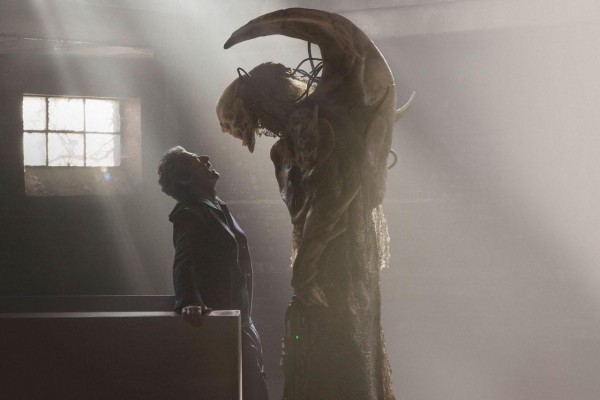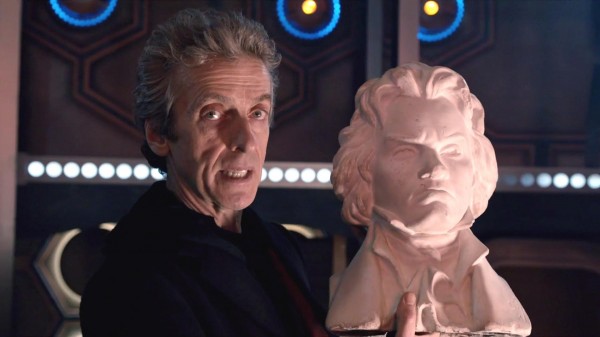
Courtesy of BBC America
The Doctor drops a paradox bomb and almost manages to save last week’s episode.
Lets bitch it out …
It appears that the writers of Doctor Who are reaching back to the pre-reboot years for their storytelling paradigm this season. How else can they explain these back-to-back two-part episodes? Before fading into obscurity in the 80s, Doctor Who relied on a four-part episodic structure that allowed the show to explore a certain amount of narrative complexity while still fitting into a half-hour time slot. This format follows a standardized formula filled with false cliffhangers, and I for one was happy that the approach wasn’t included in the reboot; the current 45 minutes is more than enough time to produce a quality narrative. Sure, there have been lots of two-part episodes over the last decade, but most of these were highly enjoyable and packed with great storytelling. Unfortunately, the same cannot be said for the current season’s two part-episodes. The first half of each of these two-parters have consisted of mostly long-winded exposition that could easily be reduced to five-minute scenes. A quick glance through the internet confirms my suspicions: Moffat has moved to a two-part format. It feels like Peter Jackson has taken over at the wheel.
As with “The Witch’s Familiar”, music features heavily in the opening of the second episode. This time, the Doctor explains the nature of a bootstrap paradox (or causal loop) through a tale involving a music-loving Time Lord and Beethoven’s fifth. The scene is cleverly written, well performed, and ends with a glorious audio-sync between the electric guitar power-chord opening measures of the fifth and the Doctor Who opening theme (I don’t remember there being that much electric guitar in the theme before). Obviously the paradox is going to play a part in the resolution of the crisis, and perhaps explain the presence of the Ghost-Doctor in the underwater base, but fortunately the writing is good enough that I didn’t figure it out until I was supposed to (as cued by numerous repeated shots of the pilot’s sarcophagus in both the “present” underwater base and “past” abandoned missile-testing site).
Drawing attention to the “fun” guitar-playing Doctor is an excellent tack for building interest in the current regeneration, but it has had an unexpected and unfortunate side effect: Clara is not fun. Her lack of gaiety is masked by the over-ebullience of the previously youthful Doctor, but this time around she has no such Gallifreyan shielding. This was painfully obvious at the start of last episode, when her puppy-dog whining for “monsters” and “mysteries” was almost enough for me to hope the Doctor would lock her in the TARDIS for the duration of the episode. By making the Doctor more fun, it draws attention to Clara as a ball-and-chain character. Her only purpose seems to be as a catalyst to draw the Doctor into action. Even he acknowledges it when he explains the placement of her name in the list of victims to be recited by his ghost projection — poor O’Donnell (Morven Christie), there really was no reason for her to die, and I agree with Bennett (Arsher Ali) taking the Doctor to task for her death.
Where the first part of this episode failed, the second part almost excelled. ‘Before The Flood’ creates complex secondary characters, and features a potentially terrifying new foe, but all were dispatched as quickly as they were introduced. Prentis is wonderfully obsequious and irritating. And what about the sumptuously malevolent Fisher King? Fantastic make-up and voice! But where was their storyline in the first episode? Why invent such wonderful characters and then cram them into a small portion of half of an episode? Prentis and the Fisher King could easily have been introduced in the first part. We should have left the flooded base much sooner and travelled to the far more interesting missile testing site, perhaps with a stop-over at Prentis’s planet on the way. Hopefully next week, the first part of the third two-parter will have a more engaging narrative, and less standing around just asking questions.

Courtesy of BBC America
Other Observations:
- The opening scene, featuring the adulation of Beethoven, represents everything I hate about current pseudo-academic popular culture. The bid for prestigious intellectual currency through reference to early 19th-century constructs of “genius” is tired, and only propagates outmoded and insidious cultural ideologies. Beyond that, there is the obvious reference to vinyl recording technology (i.e. records), which is already outmoded in Clara’s and the Doctor’s timelines. Add this to the Doctor’s “grainy” rock n’ roll guitar playing, and we’re looking at a hardcore bid for “authenticity” to lend this current Doctor cultural authority (I suppose this is the same thing that was accomplished by the last Doctor’s bowtie).
- Based on the internal logic of the episode, the causality loop is supposed to follow the sequence of events as they occur in the timeline of the loop, not as they occur in actual time (i.e. from the point of view of the loop, Pritchard dies before O’Donnel, even though O’Donnel technically dies hundreds of years before Pritchard). But, if this is the case, how could Prentis’s ghost have killed Moran?
- The dialogue isn’t nearly as witty as the first two-part episode. O’Donnel’s giddy “It’s bigger on the inside” outburst feels forced for her character (although it does help create empathy for her character when she is killed). And, I’m getting a little tired of the Doctor’s “Your story ends here” speeches. I miss Missy.
Best Lines:
- Doctor (to O’Donnel as they leave the TARDIS): “Where’s Bennet, we need to get going?”
- Bennet (nonchalantly): “Oh, he’s still throwing up. One small step for man, one giant Bleeagh!”
- Prentis (introducing himself and his planet): “Our capital city has a sign saying, ‘If you occupied us, you’d be home by now.’”
- Prentis (to the Doctor): “Although, at the risk of starting an even bigger war, YOU could enslave me. In the ship I have directions to my planet, and a selection of items that you can oppress me with.”
- The Doctor (responding to Bennet’s accusations): “This isn’t about saving me, I’m a dead man walking. I’m changing history to save Clara.”
Your turn: How do you feel about the two-part episode format this season? Why do you think the writer’s are making such an obvious bid for authenticity this season? Are you on board with the guitar playing, sunglasses wearing, Rocker Doctor?